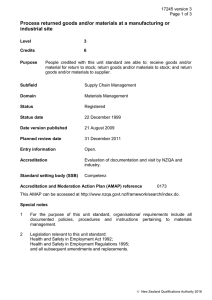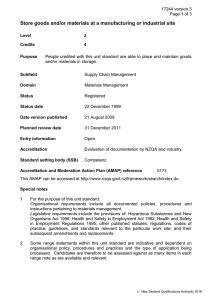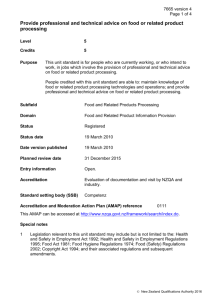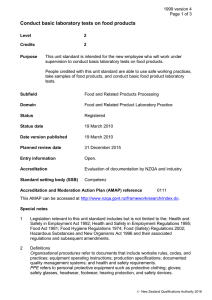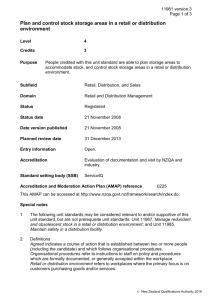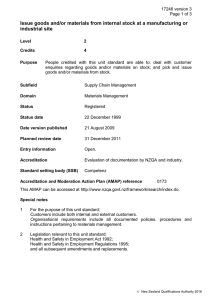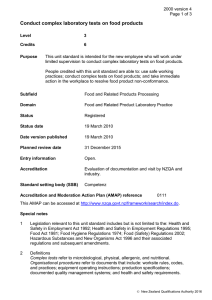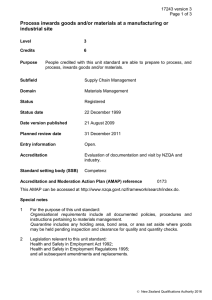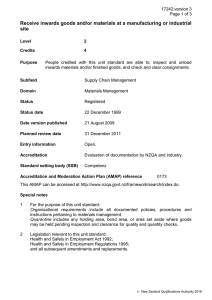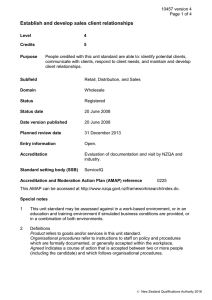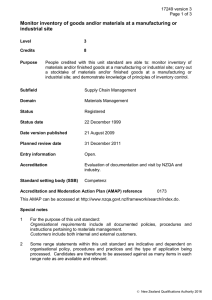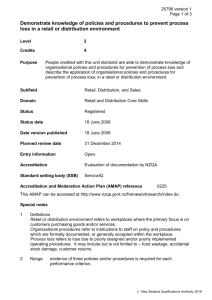24950 Operate and report on a water treatment plant under
advertisement
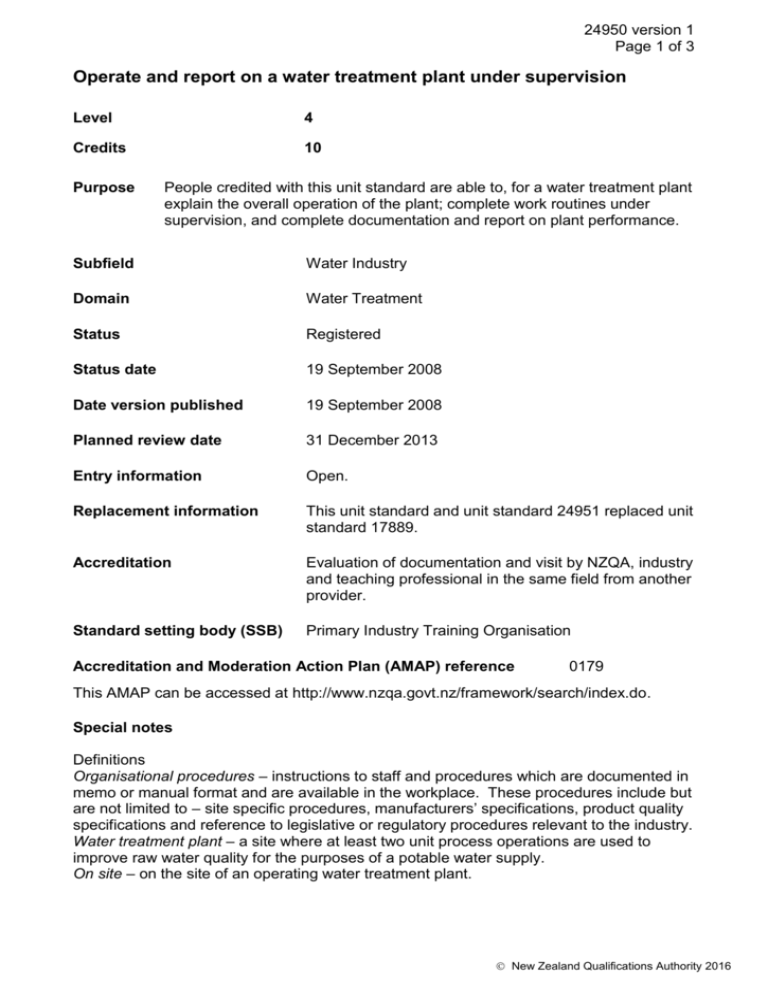
24950 version 1 Page 1 of 3 Operate and report on a water treatment plant under supervision Level 4 Credits 10 Purpose People credited with this unit standard are able to, for a water treatment plant explain the overall operation of the plant; complete work routines under supervision, and complete documentation and report on plant performance. Subfield Water Industry Domain Water Treatment Status Registered Status date 19 September 2008 Date version published 19 September 2008 Planned review date 31 December 2013 Entry information Open. Replacement information This unit standard and unit standard 24951 replaced unit standard 17889. Accreditation Evaluation of documentation and visit by NZQA, industry and teaching professional in the same field from another provider. Standard setting body (SSB) Primary Industry Training Organisation Accreditation and Moderation Action Plan (AMAP) reference 0179 This AMAP can be accessed at http://www.nzqa.govt.nz/framework/search/index.do. Special notes Definitions Organisational procedures – instructions to staff and procedures which are documented in memo or manual format and are available in the workplace. These procedures include but are not limited to – site specific procedures, manufacturers’ specifications, product quality specifications and reference to legislative or regulatory procedures relevant to the industry. Water treatment plant – a site where at least two unit process operations are used to improve raw water quality for the purposes of a potable water supply. On site – on the site of an operating water treatment plant. New Zealand Qualifications Authority 2016 24950 version 1 Page 2 of 3 Elements and performance criteria Element 1 Explain the overall operation of a water treatment plant. Range in this element, explain means describe the inputs, outputs and controls of the sections or components to show ability in operating the plant to meet organisational procedures. Performance criteria 1.1 The water flow paths through a water treatment plant are physically identified on site in accordance with organisational procedures. Range 1.2 The flow control elements are identified and explained on site in accordance with organisational procedures. Range 1.3 level, pressure, flow. The individual plant process sections are identified, and the function of each is explained, on site in accordance with organisational procedures. Range 1.4 inflow, outflow, storage, flow distribution in tanks. process objective, inflows, outflows, physical identification, water quality changes. All chemical dosing systems components are identified on a selected site and the controls of each chemical dosing system are explained in accordance with organisational procedures. Range examples – chemical pipework, dosing pumps, speed control, stroke control, flow rate, calibration tests, tank dilution, dosage level, check tests, feedback loops; solid, liquid, gas. Element 2 Complete work routines in a water treatment plant under supervision. Performance criteria 2.1 Routine plant inspections are carried out in accordance with organisational procedures. Range examples – chemical levels, stock levels, output water quality, process output, vibration, noise, alarm response, manual pump control, valve operation, filter backwash operation, sludge transfer. New Zealand Qualifications Authority 2016 24950 version 1 Page 3 of 3 2.2 Final water quality is monitored, and plant controls are adjusted to maintain final water quality, in accordance with organisational procedures. Range includes but is not limited to – level and dose settings, instrument calibration. Element 3 Complete documentation and report on water treatment plant performance. Performance criteria 3.1 Process data is collected and recorded in accordance with organisational procedures. 3.2 Routine reports are compiled from plant and system data in accordance with organisational procedures. Please note Providers must be accredited by NZQA, or an inter-institutional body with delegated authority for quality assurance, before they can report credits from assessment against unit standards or deliver courses of study leading to that assessment. Industry Training Organisations must be accredited by NZQA before they can register credits from assessment against unit standards. Accredited providers and Industry Training Organisations assessing against unit standards must engage with the moderation system that applies to those standards. Accreditation requirements and an outline of the moderation system that applies to this standard are outlined in the Accreditation and Moderation Action Plan (AMAP). The AMAP also includes useful information about special requirements for organisations wishing to develop education and training programmes, such as minimum qualifications for tutors and assessors, and special resource requirements. Comments on this unit standard Please contact the Primary Industry Training Organisation standards@primaryito.ac.nz if you wish to suggest changes to the content of this unit standard. New Zealand Qualifications Authority 2016
